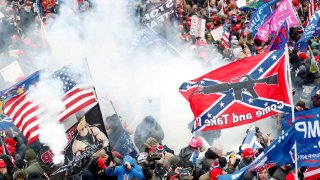
- At least 1,000 people so far have been arrested on charges related to the Jan. 6, 2021, riot at the U.S. Capitol, the Department of Justice said.
- More than half of those defendants have pleaded guilty to crimes, the DOJ said.
- The update comes as the department is investigating former President Donald Trump for his conduct leading up to and on the day of the riot by hundreds of his supporters.
- The siege disrupted a joint session of Congress that later confirmed the election of Joe Biden as president.
At least 1,000 people so far have been arrested on charges related to the Jan. 6, 2021, riot at the U.S. Capitol by a mob of Trump supporters, the Department of Justice said Monday.
About 518 people have pleaded guilty to federal crimes so far, the DOJ said in an update marking 26 months since the riot.
Around one-third of Capitol riot defendants have been charged with assaulting, resisting or impeding police during the attack, the DOJ said. About 420 defendants have already been adjudicated and sentenced for their criminal activity. Another 53 people were found guilty at trials, DOJ said.
We've got the news you need to know to start your day. Sign up for the First & 4Most morning newsletter — delivered to your inbox daily. Sign up here.
"The Department of Justice's resolve to hold accountable those who committed crimes on January 6, 2021, has not, and will not, wane," the update said.
The department said the approximate financial losses "suffered as a result of the siege at the Capitol" totaled $2.88 million as of Oct. 14.
Those losses reflect damage to the Capitol building and grounds, as well as costs borne by the Capitol Police. About 140 police officers were assaulted during the riot.
Money Report
The new tallies come as the DOJ is investigating former President Donald Trump for actions leading up to and on the day of the riot, when hundreds of his supporters swarmed around and then breached the Capitol, sending members of Congress fleeing.
The attack interrupted a joint session of Congress that had been meeting that day to confirm the Electoral College victory of President Joe Biden.
For weeks after losing the popular presidential vote, Trump falsely claimed that he actually won the race and that Biden was being awarded the Electoral College win as a result of widespread ballot fraud in a handful of swing states.
The DOJ and other agencies found no such widespread fraud that swung the election to Biden.
On Dec. 18, 2020, shortly after meeting with a group of allies who discussed ideas to overturn his loss, which included potentially seizing voting machines rerunning the election, Trump tweeted that people should travel to Washington, D.C., on Jan. 6.
"Be there, will be wild," Trump wrote.
On Jan. 6, Trump was the headline speaker at a rally outside the White House, where he urged a crowd to march to the Capitol and "fight" against confirmation of Biden's victory.
"President Trump summoned the mob, assembled the mob and lit the flame of this attack," said then-Rep. Liz Cheney, R-Wyo., in June when she and other members of the select House committee that investigated the riot began publicly detailing their findings.
In December, the committee referred Trump for investigation and possible prosecution for his conduct, which included his urging his vice president, Mike Pence, to reject the Electoral College ballots of a number of swing states that Biden won.
The committee said there was sufficient evidence to refer Trump for four crimes: obstructing an official proceeding, conspiracy to defraud the government, making knowingly and willfully materially false statements to the federal government, and inciting or assisting an insurrection.
Trump, who is seeking the 2024 Republican presidential nomination, has denied any wrongdoing.






